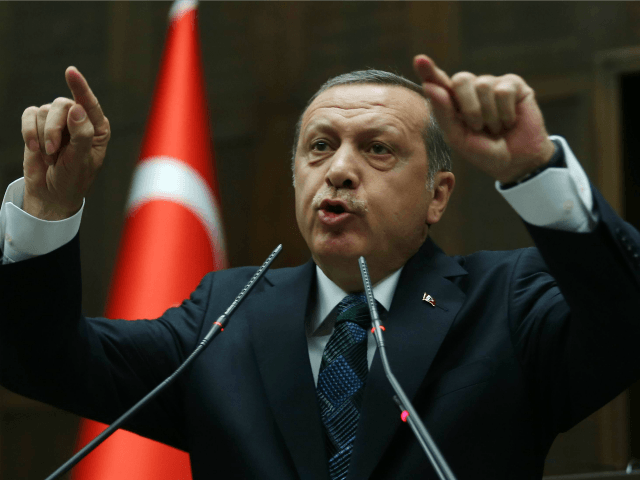As Turkey prepares to observe the anniversary of the coup attempt against Islamist President Recep Tayyip Erdogan on Saturday, the Turkish president delivered a speech Thursday condemning the United States and Europe for what he alleged was insufficient support for his government.
The Turkish government attempted to organize July 15 commemoration events in Germany, Austria, and the Netherlands, all of which banned such events. The United States turned down an advertising buy from the Turkish government to place posters celebrating Erdogan on the occasion in the Washington, DC, metro. The U.S. embassy in Ankara has also warned American citizens to avoid coup commemoration events, as Turkish state-friendly media have promoted a conspiracy theory that the United States organized the failed coup, and American citizens may face violence at emotionally charged commemoration events.
Despite the warning, American Secretary of State Rex Tillerson issued a statement this week commemorating “the Turkish people – brave men and women – [who] stood up against coup plotters and defended their democracy.” “I take this moment to recognize their courage and honor the victims of the events of July 15, 2016,” he said.
That statement appeared not to be enough for Erdogan, who implied before an audience on Thursday that Turkey upholds personal freedoms better than the West. “We see the U.S. does not allow July 15 posters displayed on subways. We see similar things in Europe. We went to the G20 summit and wanted to meet our citizens in hall meetings. The applications were submitted, however, they did not allow the president of Turkey, they did not allow the ministers. When it comes to it, they talk about freedoms. What kind of freedom is this?” Erdoğan asked.
In his remarks, Prime Minister Binali Yıldırım also attacked the United States and Europe for refusing to allow mass Turkish demonstrations or state-run propaganda in their public transit systems. “The attitude that the U.S. and some European countries have taken towards various July 15 commemoration events is not acceptable under any circumstances,” Yıldırım protested, claiming these countries “constantly criticize Turkey on human rights and freedoms.”
Under Erdogan, the Turkish government has shut down hundreds of media outlets and arrested and prosecuted hundreds for “insulting the president” or otherwise criticizing the ruling Islamist Justice and Development Party (AKP). Major newspaper and broadcast outlet editors and producers have faced prosecution for generating content the AKP has branded illegal. Turkish police have arrested nearly 50,000 people since the July 15 coup for alleged ties to Fethullah Gulen, a U.S.-based cleric Erdogan claims orchestrated the failed coup. Months after the coup attempt, the Turkish government confirmed American claims that Ankara had not sent Washington any proof that Gulen was involved in the events of July 15. Gulen himself denies any involvement, while the leaders of the coup attempt made no mention of him. Instead, coup plot leaders issued a statement that day announcing that they had acted “with the aim of reinstalling the constitutional order, democracy, human rights and freedoms, to make rule of law pervade again, to re-establish the ruined public order.”
The United Nations has accused the Turkish government of human rights violations against those arrested following the failed coup.
With government attempts to impose July 15 memorials abroad prevented, Erdogan addressed the Turkish crowd and called for the failed coup attempt observances to become an annual tradition. “What makes a nation are such traditions and ceremonies that have been evolved from turning points in their history. Maybe we are not aware of that right now because we are living in it, but we are leaving a very important legacy to the future generations,” he told the crowd.
“We will continue to remember July 15 with more comprehensive programs in the future,” he promised.

COMMENTS
Please let us know if you're having issues with commenting.